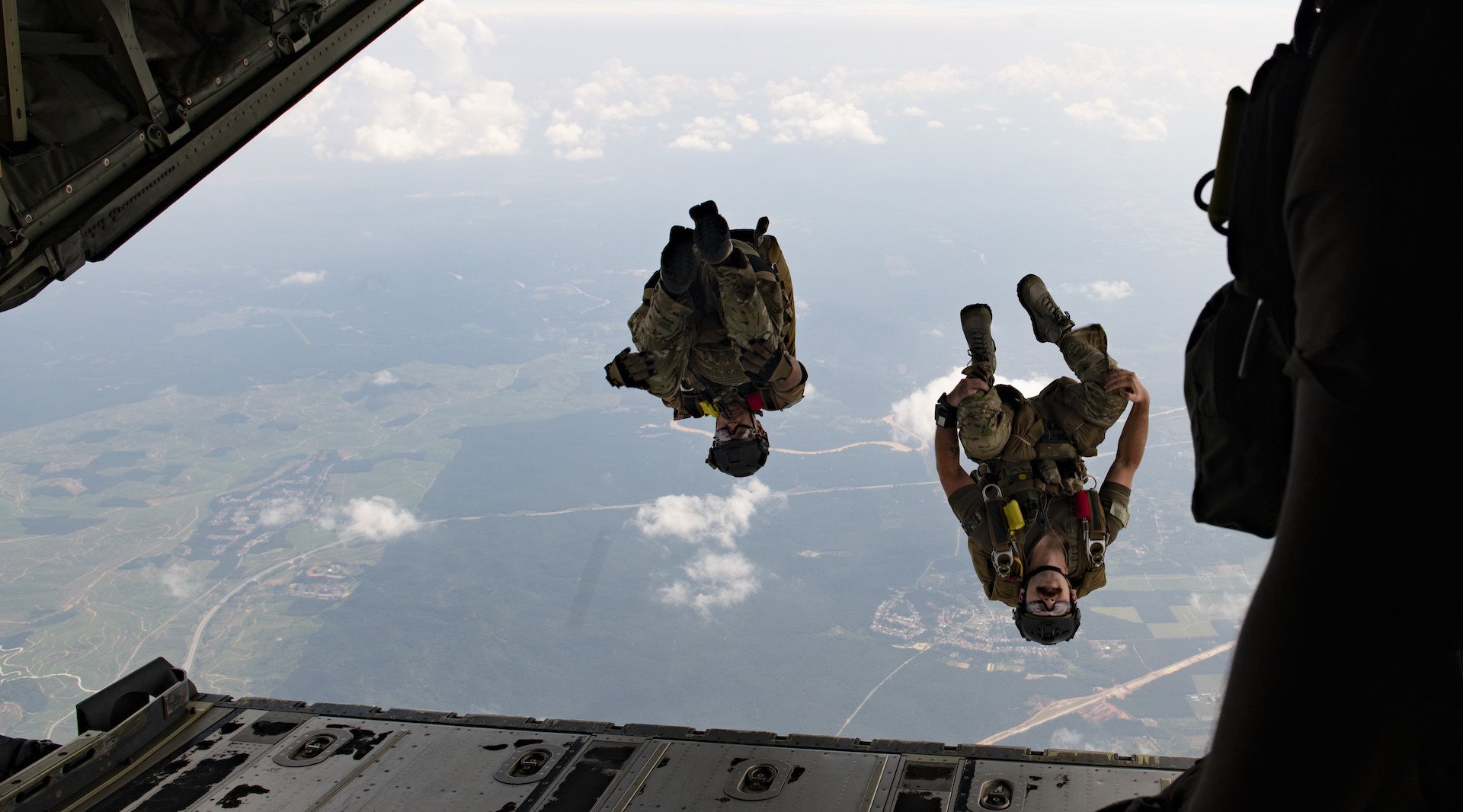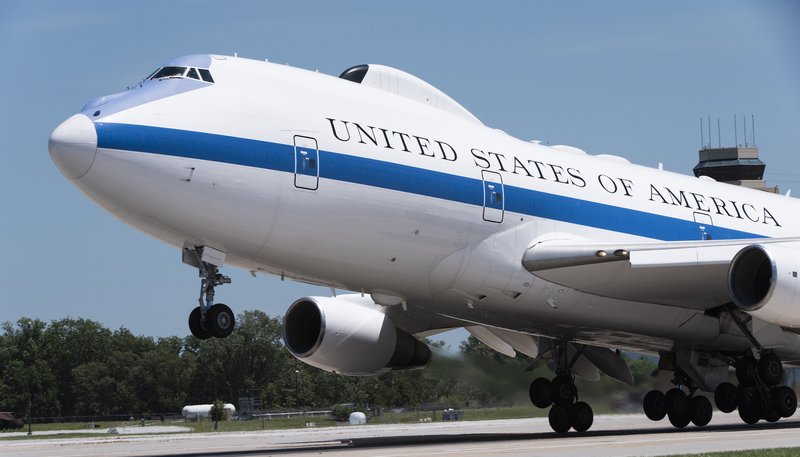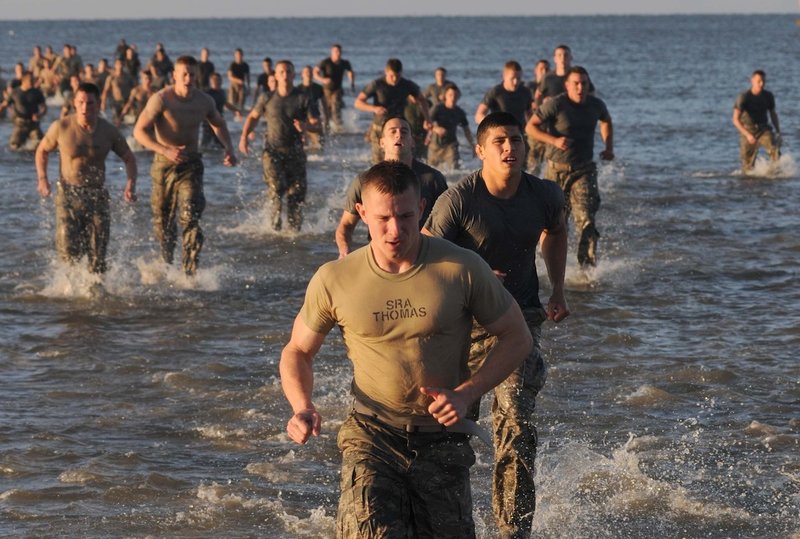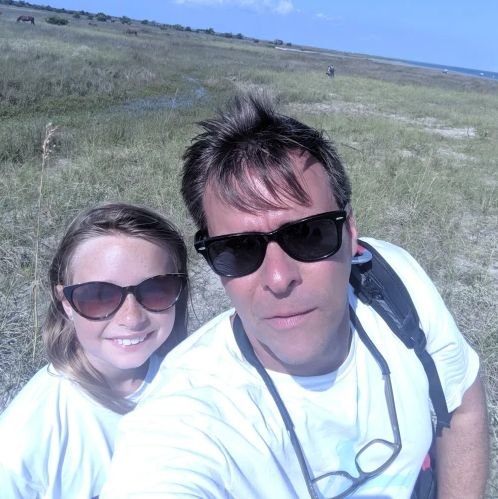Air Force ‘Flips,’ Says Special Ops, Recruiters, and Others Won’t Face Pay Cuts

U.S. Air Force pararescuemen exit the back of a C-130J Super Hercules Exercise Pacific Angel at Kuantan Air Base, Malaysia, Aug. 18, 2022. U.S. Air Force photo by Senior Airman Jessi Roth.
Hundreds of Air Force special ops troops, recruiters, cryptology specialists, and others with high-tempo jobs will not see pay cuts next month.
Air Force Secretary Frank Kendall announced at the annual Air & Space Forces Association's conference this week that planned reductions to special duty assignment pay, or SDAP, would not go into effect in October. About 30,000 airmen, or slightly less than 10% of the active-duty force, receive SDAP pay each month, which can vary from $75 for junior troops to as high as $450 for senior leaders.
The pay goes to most troops in the service's special ops jobs, as well as those in high-intensity jobs around national defense assets like nuclear weapons, cryptology, and airborne command posts. SDAP also goes to several public-facing jobs, like flight attendants and crew chiefs on VIP jets, contracting troops, those assigned to presidential details, and professional military education instructors.

An E-4B National Airborne Operations Center aircraft takes off from Offutt Air Force Base, Nebraska, July 10, 2019. The E-4B provides travel support for the secretary of defense to ensure command and control connectivity outside of the continental United States. US Air Force photo by Staff Sgt. Jacob Skovo.
A shortfall in the 2023 budget had left the Air Force short of money to pay the full SDAP for the roughly 30,000 troops who receive it. The Air Force budget defines jobs eligible for SDAP as those "which are extremely difficult and/or duties which involve an unusual degree of responsibility in a military skill."
Air Force officials had announced over the summer that several hundred troops across 11 career fields would lose half their special pay in October due to the budget shortfall, with the other half going away in 2024. The fields to be affected by the pay cuts were:
- Cryptologic Language Analyst
- Enlisted Professional Military Education Instructor
- Defense Threat Reduction Agency
- C-146 Flying Crew Chief
- Defense Courier
- Flight Attendant
- National Airborne Ops Support
- Airborne Mission Operator
- Presidential Logistics Squadron
- Radio Operator on the National Airborne Operating Center (a highly specialized plane that can serve as a central command post for all of the US military)
- Diagnostic Medical Sonography
The Air Force, Kendall said, "will restore all the cuts to special duty assignment pay that were scheduled to take place on October 1." Kendall did not say where the money would come from to cover the shortfall.

Combat control trainees from the 334th Training Squadron run back on shore after doing 100 jumping jacks in the Gulf of Mexico during a physical training session April 12, 2013, on Biloxi beach. US Air Force photo by Kemberly Groue.
Hundreds of Air Force special ops troops, recruiters, cryptology specialists, and others with high-tempo jobs will not see pay cuts next month.
Air Force Secretary Frank Kendall announced at the annual Air & Space Forces Association's conference this week that planned reductions to special duty assignment pay, or SDAP, would not go into effect in October. About 30,000 airmen, or slightly less than 10% of the active-duty force, receive SDAP pay each month, which can vary from $75 for junior troops to as high as $450 for senior leaders.
The pay goes to most troops in the service's special ops jobs, as well as those in high-intensity jobs around national defense assets like nuclear weapons, cryptology, and airborne command posts. SDAP also goes to several public-facing jobs, like flight attendants and crew chiefs on VIP jets, contracting troops, those assigned to presidential details, and professional military education instructors.
E-4B National Airborne Operations Center Takeoff (1920x1097, AR: 1.75)
A shortfall in the 2023 budget had left the Air Force short of money to pay the full SDAP for the roughly 30,000 troops who receive it. The Air Force budget defines jobs eligible for SDAP as those "which are extremely difficult and/or duties which involve an unusual degree of responsibility in a military skill."
Air Force officials had announced over the summer that several hundred troops across 11 career fields would lose half their special pay in October due to the budget shortfall, with the other half going away in 2024. The fields to be affected by the pay cuts were:
- Cryptologic Language Analyst
- Enlisted Professional Military Education Instructor
- Defense Threat Reduction Agency
- C-146 Flying Crew Chief
- Defense Courier
- Flight Attendant
- National Airborne Ops Support
- Airborne Mission Operator
- Presidential Logistics Squadron
- Radio Operator on the National Airborne Operating Center (a highly specialized plane that can serve as a central command post for all of the US military)
- Diagnostic Medical Sonography
The Air Force, Kendall said, "will restore all the cuts to special duty assignment pay that were scheduled to take place on October 1." Kendall did not say where the money would come from to cover the shortfall.
Combat control trainees (1200x808, AR: 1.49)
Even among special ops troops, some who hold specific jobs and assignments were scheduled to see a cut in SDAP, including those who collected the monthly bonus because they were assigned to the 724th Special Tactics Group or Joint Special Operations Command. Among specific special warfare jobs, only one — combat control — was scheduled to see an SDAP drop, while similarly trained and deployed pararescuemen, tactical air control party (TACP), and special reconnaissance troops did not face a loss in pay.
- Human Intelligence
- Combat Controller
- 724th Special Tactics Group
- Joint Special Operations Command
- Aircraft Battle Damage Repair/Expeditionary Depot Maintenance
- White House Communications Agency
- Parachuting Instructor
- Cyber Warfare
- Recruiter
- Weapons Director
- Army Support Weather Operator
- White House Shelter Complex
- Cyber Intelligence Analysis
- Sensor Operator
- 844th Communications Squadron, Executive Communications Flight
- Command and Control (C2) Operations
- Nuclear Aircraft Maintenance
- Security Forces Nuclear Support
- Contracting
- Cyberspace Mission Force
- Special Operations Surgical Team
- Modular Airborne Fire Fighting System
Finally, the Air Force had planned to add several jobs to begin receiving SDAP that previously did not:
- Electronic Security System Maintenance
- Communications and Munitions Specialist in specific Nuclear Command, Control, and Communications squadrons
- International Enlisted Engagements Manager
- Space Force Senior Enlisted Leader
- Radar Weather Systems
- Casualty Cell
- Fire Protection
- 341st Training Squadron Military Working Dog Handler
Read Next: Activist Group Floods Veterans Crisis Line With Protest Calls
Inside the Special Forces Combat Diver Qualification Course

Matt White is a former senior editor for Coffee or Die Magazine. He was a pararescueman in the Air Force and the Alaska Air National Guard for eight years and has more than a decade of experience in daily and magazine journalism.
BRCC and Bad Moon Print Press team up for an exclusive, limited-edition T-shirt design!
BRCC partners with Team Room Design for an exclusive T-shirt release!
Thirty Seconds Out has partnered with BRCC for an exclusive shirt design invoking the God of Winter.
Lucas O'Hara of Grizzly Forge has teamed up with BRCC for a badass, exclusive Shirt Club T-shirt design featuring his most popular knife and tiomahawk.
Coffee or Die sits down with one of the graphic designers behind Black Rifle Coffee's signature look and vibe.
Biden will award the Medal of Honor to a Vietnam War Army helicopter pilot who risked his life to save a reconnaissance team from almost certain death.
Ever wonder how much Jack Mandaville would f*ck sh*t up if he went back in time? The American Revolution didn't even see him coming.
A nearly 200-year-old West Point time capsule that at first appeared to yield little more than dust contains hidden treasure, the US Military Academy said.












